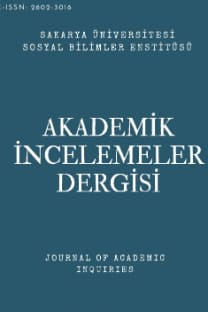Atık Yönetimi ve Muhasebesi: Sakarya’daki İşletmeler Üzerinde Bir Araştırma
İşletmeler katma değer yaratırken faaliyetleri gereği çevresel kaynakları kullanmak durumundadırlar. İşletmelerin üretimleri sırasında mal ve hizmet çıktıları ile birlikte, katı, sıvı, gaz atıkları ve tehlikeli atıklar ortaya çıkmaktadır. Ortaya çıkan bu çeşitli çevresel etkilerle ilgili fiziksel ve mali boyutların belirlenebilmesi, ölçülebilmesi ve muhasebe sistemi içerisinde daha belirgin hale getirilmesi önem arzetmektedir. Bu nedenle işletmelerin karar alma sürecinde gerek duyulan çevresel olgulara ilişkin verilerin hazırlanmasını sağlayacak yöntem ve tekniklerin muhasebe sistemine konulması gereklidir.Türkiye’de KOBİ’ler gerek sanayi yapısının önemli bir bölümünü oluşturmaları, gerekse dinamik ve esnek yapıları sayesinde önemli bir konuma sahiptirler. Fakat KOBİ’ler yeterli araç ve kaynağa sahip olamadıklarından ötürü çevre ve atık yönetimi konusunda sorun olmaktadırlar. Bu çalışma sonucunda Sakarya ilindeki işletmelerin çevre ve atık yönetimi konusundaki faaliyetleri ve aralarındaki ilişki ile bunların muhasebeleştirme düzeyleri ortaya konulmuştur.
Anahtar Kelimeler:
Çevre Muhasebesi, Atık Yönetimi ve Muhasebesi
Atık Yönetimi ve Muhasebesi: Sakarya’daki İşletmeler Üzerinde Bir Araştırma
While creating added-value, enterprises, because of the very nature of their activities, are meant to make use of the environmental resources. During their production, together with the goods and services they produce, solid, liquid and gas wastes and dangerous wastes also emerge. Detecting physical and financial aspects of these various environmental effects, and highlighting them within the accounting system is of utmost importance. Thus, it is crucial to include methods and techniques in accounting system which help prepare data about environmental phenomenon needed in the decision making process of enterprises. Small and Medium Size Enterprises (SMEs) are of great value in Turkey not only because they make up a significant part of the industry but also they have a dynamic and flexible nature. Yet, due to lack of sufficient equipments and resources, SMEs cause to environmental and waste management problems. As a result of this study, activities of enterprises in Sakarya about environment and waste management, relationship between them and their levels of applying these into accounting have been displayed.
___
- ARIKAN, Fatma (2005), Çevre Yönetim Sisteminde Eko Yönetim Ve Denetim Sistem (Emas) Uygulaması: Ostim Örneği, Basılmamış Yüksek Lisans Tezi Hacettepe Üniversitesi Fen Bilimleri Enstitüsü.
- ELEWA, May M. (2007), The Impact of Environmental Accounting on the Profit Growth, Development and Sustainability of the Organization: A Case Study on Nypro Inc., Master Thesis, University of Massachusetts Lowell, Egypt. İKV, (İktisadi Kalkınma Vakfı), (2005), “Avrupa Birliği’nin Çevre Politikası”, (http://www.ikv.org.tr/pdfs/4f3a608d.pdf, 10.09.2009)
- JACHNIK, Raphaël, (2006), Assessing The Practical Relevancy Of Environmental Cost Accounting For Industrial Waste :Waste Accounting, Process Efficiency And Cleaner Production, IIIEE Theses, Thesis for the fulfilment of the Master of Science in Environmental Management and Policy Lund, Sweden.
- KAYA, Uğur, (2006), İşletme- Doğal Çevre İlişkilerinin Mali Tablolar Aracılığıyla Raporlanması ve Denetimi, Sermaye Piyasası Kurulu, Yayın No:201, Ankara.
- QIAN, Wei ve· Roger Burritt, (2007), “Environmental Accounting For Waste Management: A Study of Local Governments in Australia”, Environmentalist, V: 27, P: 143–154.
- Resmi Gazete,(2006), “Dokuzuncu Kalkınma Planı (2007–2013), Sayı: 26215, 1 Temmuz 2006.
- Resmi Gazete, (2005), “Küçük Ve Orta Büyüklükteki İşletmelerin Tanımı, Nitelikleri Ve Sınıflandırılması Hakkında Yönetmelik”, Tarih: 18 Kasım 2005, Sayı: 25997.
- T.C. Sayıştay Başkanlığı, (2007), Türkiye'de Atık Yönetimi Ulusal Düzenlemeler ve Uygulama Sonuçlarının Değerlendirilmesi Performans Denetimi Raporu, Ankara.
- Yayın Aralığı: Yılda 2 Sayı
- Başlangıç: 2006
- Yayıncı: Sakarya Üniversitesi Sosyal Bilimler Enstitüsü
Sayıdaki Diğer Makaleler
Kentsel Dönüşümlerden Sosyal Değişmelere: Pendik Belediyesi Örneği
Atık Yönetimi ve Muhasebesi: Sakarya’daki İşletmeler Üzerinde Bir Araştırma
Hilmi KIRLIOĞLU, Meral Erol FİDAN
Markov Zinciri Yöntemi İle Taşınabilir Bilgisayar Tercihlerinin Analizi
Muhasebe Kültürü Bağlamında Yapılan Seçilmiş Bazı Çalışmaların Metodolojik Analizi
Yalçın TECİMER, Selehattin KARABINAR
Entelektüeller, Üniversiteler ve Bilimsel Bilginin Üretilmesi Kapsamında Eleştirel Bir Deneme
